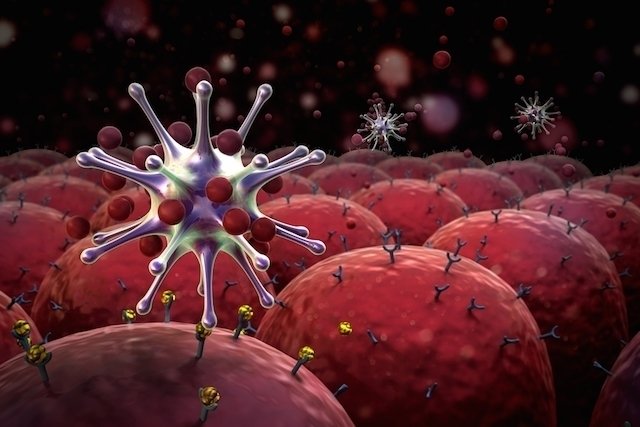Oral sex has a low possibility of transmitting HIV, even in situations where condoms are not used. However, there is still a risk, especially for people who have a wound in the mouth and who have contact with people with the HIV virus who do not undergo treatment according to the doctor’s instructions, as in this case there is a greater quantity of virus circulating.
Therefore, it is recommended to use a condom at any stage of sexual intercourse, as this makes it possible to avoid contact with the HIV virus.
Although the risk of HIV infection is low through oral sex without a condom, there are other sexually transmitted infections (STIs), such as HPV, chlamydia and/or gonorrhea, which can also be transmitted from one person to another through oral sex. Learn about the main STIs, how they are transmitted and their symptoms.

When there is greater risk
The HIV virus is transmitted through seminal and vaginal fluids, so there is a greater risk of transmitting the virus when you perform oral sex on another person who has the HIV virus and, at the same time, have bleeding gums, cuts or ulcers in the mouth. .
However, having contact with the HIV virus does not necessarily indicate that the person will develop the disease, because it depends on the amount of virus to which they were exposed and the response of their immune system. However, as it is only possible to know the viral load through specific blood tests, sexual contact without a condom is considered high risk. Better understand the difference between AIDS and HIV.
Other forms of transmission
The main forms of HIV transmission include:
- Direct contact with the blood of people with HIV/AIDS;
- Contact with secretions from the vagina, penis and/or anus;
- Via mother and newborn, when the mother has the disease and is not undergoing treatment;
- If the mother has the disease, breastfeed the baby, even though she is undergoing treatment.
Situations such as sharing glasses or cutlery, contact with sweat or kissing on the mouth do not present a risk of contamination. On the other hand, to develop the disease, the infected person’s immune system must be more compromised, because the person can carry the virus and not manifest the disease.
What to do in case of suspicion
When there is a suspicion of HIV infection after having oral sex without using a condom, or if the condom has broken or come off during sexual intercourse, it is recommended to see a doctor within 72 hours after the incident, so that the condition can be assessed. need to use PEP, which is Post-Exposure Prophylaxis.
PEP is a treatment made with some medicines that prevent the virus from multiplying in the body, and must be done for 28 days, strictly following the doctor’s instructions.
There is also the possibility that the doctor will request a rapid HIV test, which is carried out at the health unit and the results will be available within 30 minutes. This test can be repeated after 28 days of PEP treatment, if the doctor deems it necessary. See what to do if you suspect HIV infection.
If the result is positive for HIV, the person will be referred to begin treatment, which is confidential and free, in addition to having the help of psychology or psychiatry professionals.
How to reduce your risk of getting HIV
The main way to prevent contact with HIV, whether orally or through another form of sexual contact, is through the use of condoms during sexual intercourse. However, other ways to avoid infection with the HIV virus are:
- Carry out an annual test to check the presence of other STIs;
- Reduce the number of sexual partners;
- Avoid direct contact or ingestion of bodily fluids, such as semen, vaginal fluid and blood;
- Do not use syringes and needles already used by other people;
- Give preference to going to manicurists, tattoo artists or podiatrists who use disposable materials or who follow all the rules for sterilizing the materials used.
It is also recommended that a rapid HIV test be carried out at least every six months, so that, if there is infection, treatment can be started before symptoms appear, in order to prevent the onset of AIDS.
Bibliography
- NHS. Can HIV be transmitted through oral sex (fellatio and cunnilingus)?. Disponível em: <https://www.nhs.uk/common-health-questions/sexual-health/can-hiv-be-transmitted-through-oral-sex-fellatio-and-cunnilingus/>. Acesso em 29 jun 2023
- CDC. Oral Sex and HIV Risk. Available at: <https://www.cdc.gov/hiv/risk/oralsex.html>. Accessed on 17 Jul 2020
- MINISTRY OF HEALTH. Rapid HIV test: find out the result in 30 minutes. Available at: <http://www.aids.gov.br/pt-br/noticias/teste-rapido-de-hiv-saiba-o-resultado-em-30-minutos>. Accessed on 17 Jul 2020
- HIV RISK. How can I prevent getting or transmitting HIV?. Available at: <https://hivrisk.cdc.gov/can-prevent-getting-transmitting-hiv/>. Accessed on 17 Jul 2020
- CDC. Prevention. Available at: <https://www.cdc.gov/hiv/basics/prevention.html>. Accessed on 17 Jul 2020

Sign up for our newsletter and stay up to date with exclusive news
that can transform your routine!
Warning: Undefined array key "title" in /home/storelat/public_html/wp-content/plugins/link-whisper-premium/templates/frontend/related-posts.php on line 12
Warning: Undefined array key "title_tag" in /home/storelat/public_html/wp-content/plugins/link-whisper-premium/templates/frontend/related-posts.php on line 13




